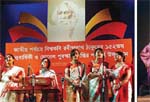 Leading artistes and troupes presented timeless songs, poems and dance of Rabindranath Tagore on Wednesday evening at the National
Leading artistes and troupes presented timeless songs, poems and dance of Rabindranath Tagore on Wednesday evening at the National
Theatre Hall of Bangladesh Shilpakala Academy.
It was the second part of the day-long Tagore 152th birth anniversary celebrations programme organised by ministry of cultural affairs.
Prime Minister Sheikh Hasina inaugurated the programme in the morning at the Osmani Auditorium in the capital.
Beside the programme at Shilpakala, the ministry had also organised cultural programmes at sites pertaining to Tagore’s memory including Shilaidaha in Kustia, Sahazadpur in Sirajganj, Dokkhindihi in Khulna and Patiswar in Naoga.
The show at Shilpakala began with chorus rendition of Jayo tomo bichitro anonde by the artistes of the repertory group of the academy, followed by Jaago jaago rey jaago in chorus that received loud applause from the audience.
Artistes of Surer Dhara presented Pran bhoriye nesha horiye creating a joyous atmosphere in the hall.
Recitation artiste Rafiqul Islam, in his stentorian voice, presented poems number 1 and 5 from Tagore’s Nobel winning poetry collection Gitanjali. Maskur A-Sattar Kallol’s spontaneous presentation of poem Kripan and Nomita Khan’s recitation of Abhisar, a poem from Sanchoita unveiled the beauty Tagore’s poems to the listeners.
The sound of ghungroos filled the air when Shilpakala Academy repertory presented a colourful group dance synchronised with songs Biswa bira robey and Sundoro botey tabo.
Noted singer Bulbul Islam melodiously sang a solo of Amar khela jokhon chhilo. Fahim Hossain Chowdhury’s rendition of Dakbo na dakbo na made the evening more pleasant. The audience also acclaimed solo rendition of songs Amar ja achhe, Ami sudhu roinu baki and Amar moner koney by Dipa Pal, Ashikur Rahman and Swati Sarkar respectively.
Shimu Day and Himadri Shekher Talukdar and Semonty Manjuri also received audience appreciation through their presentation of Kobey ami bahir holem, Ei korechho bhalo and Tai tomar anondo amar porey.
The programme ended with Lokonatya Dal’s staging of Tagore’s comedy Rath Jatra. Directed by eminent theatre director Liaquat Ali Lucky, Rath Jatra reveals the grave issues of Hindu caste system widely prevalent during that era, through the presentation of a simple story of a king whose carriage gets stuck on the road. While all the engineers and soldiers fail to move the carriage, a group of low caste men effortlessly make it run freeing the king from his helpless situation. The play sends out a loud, clear message that castes are man-made that have no bearing whatsoever on one’s capabilities.
-With New Age input




















